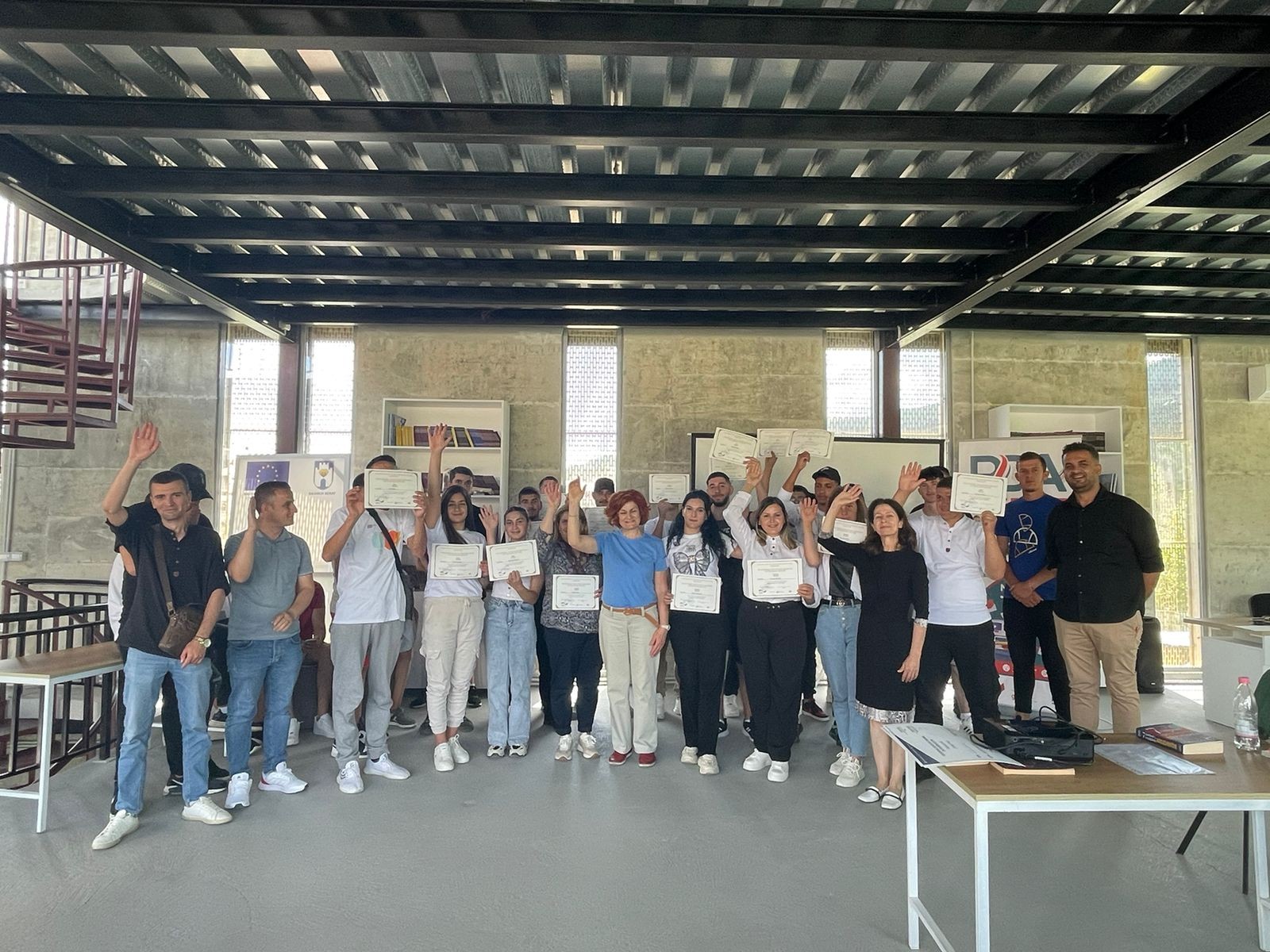
Sector: Tourism, Hospitality
Tourism in Albania has been growing rapidly in recent years. Despite various strategies being adopted, successive governments have increasingly recognized the tourism sector’s potential to drive economic development. Among the towns with the most promise is Berat, a UNESCO World Heritage site since 2008.
Berat stands out due to its unique blend of cultural and natural tourism, making it a distinct destination in the region. However, despite its potential, the area has historically lacked consistent and strategic investment. While both private businesses and public institutions have recently begun to focus more on tourism development in Berat, there is still a need for well-structured, sustainable practices to fully harness its potential.
Impact and Outcomes
The project delivered tangible, measurable results that exceeded initial expectations and had a significant positive impact on both participants and the local tourism economy.
Key Results:
• 20 participants were successfully trained as “Welcoming Waiters” in modules including:
o Preparing and serving in the dining area
o Introduction to the world of wines
o Basic kitchen and bar concepts
o Bon-Ton etiquette, body language, and customer service sales strategies
A hospitality expert from the Albanian Diaspora was also invited to share international experience and best practices. He integrated green knowledge (such as food waste recycling) and digital skills to show how modern, sustainable practices can be applied in daily service operations.
• 30 participants were trained as Receptionists under the module “Reception Front Desk: Basic Digital and Personal Skills for Office Tasks,” which included:
o Booking and reservation systems (e.g., Booking.com)
o Social media management
o Preparing a CV and job interview skills
o Online job search techniques
Gender Inclusion & Participation:
One of the main challenges faced by RDAB (Regional Development Agency Berat) was engaging women in the training and supporting them toward employment or self-employment. Thanks to RDAB’s good reputation and the dedicated work of its staff, this challenge was successfully overcome:
• 50% of participants were women, exceeding the original target of 40%.
• Total participants reached 50, surpassing the initial goal of 45. Although there were 70 applications, a selection process narrowed the final group to 50.
• Recruitment success was due to a combined outreach strategy, using social media and word-of-mouth, particularly effective in reaching rural communities.
Employment Outcomes:
• The project initially aimed for 20% of participants to become employed or self-employed.
• In reality, over 95% of the trainees have already found employment or started their own businesses—a remarkable success.
• This was achieved through several strategic actions:
o RDAB made informal agreements with local businesses before the training began, ensuring alignment between skills taught and labor market needs.
o Business sector professionals served as coaches and mentors throughout the training.
o The structure of the training—70% practical training within businesses—helped participants integrate more easily into real job environments.
Broader Community Impact:
As tourism continues to be one of the main sources of income in Berat, many local families quickly adapted by converting parts of their homes into Bed & Breakfast (B&B) accommodations. This not only created self-employment opportunities for the trainees but also contributed to the growth of community-based tourism, further strengthening the local
Transferability & Scalability
The success of this hospitality training project demonstrates a model that is highly transferable and scalable across different sectors and regions-particularly those aiming to address youth unemployment, empower women, and promote sustainable development. Key aspects of this initiative can be adapted and applied in other fields, provided the local context is considered. Here’s how:
1. Transferability to Other Fields and Sectors
a. Structure and Methodology
• The three-pillar model—Training Program, On-the-Job Training, Employment Facilitation—is universally applicable. It can be replicated in sectors such as:
o Agriculture (e.g., organic farming, agritourism)
o Craftsmanship & Creative Industries (e.g., textile making, local artisan products)
o ICT and Digital Services (e.g., coding bootcamps, digital marketing)
o Renewable Energy (e.g., solar panel installation and maintenance)
• The 70% hands-on, 30% theoretical structure is particularly effective for practical skills development and could be mirrored in vocational training programs for electricians, mechanics, or healthcare assistants.
b. Gender-Inclusive Approach
• The program successfully increased women’s participation through targeted outreach and trust-building—a strategy transferable to male-dominated sectors like construction or ICT.
• Building partnerships with local women’s organizations and leveraging word-of-mouth in rural areas is a replicable method to boost female engagement.
c. Use of Local Business Partnerships
• Involving local businesses as mentors and placement partners can work across industries. For example:
o In manufacturing, companies can provide internships in quality control or assembly line work.
o In healthcare, clinics can host trainees in roles like administrative support or patient care assistants.
2. Scalability Within and Beyond the Region
a. Regional Expansion
• The model can be scaled across other regions of Albania or the Western Balkans with high youth unemployment and tourism potential.
• Each region could tailor training modules to reflect local economic strengths (e.g., coastal hospitality in Vlora, mountain ecotourism in Gjirokastër).
b. International Scalability
• In countries with similar socio-economic contexts (e.g., Georgia, North Macedonia, Kosovo), this model could be integrated into EU-funded regional development or youth employment projects.
• Returnee integration is a transferable element for other countries facing emigration and reintegration challenges.
3. Cross-Sector Adaptation of Key Components
Component Hospitality Example Cross-Sector Application
Practical Learning (70%) Waiters trained in live restaurants ICT students develop software for real clients
Green & Digital Integration Food waste recycling, booking systems Renewable energy: solar tech + digital monitoring
Local Mentorship Coaches from hotels and B&Bs Artisan mentors in traditional crafts
Employment Facilitation Job matching with tourism businesses Startup support in agri-business or freelancing
4. Supporting Factors for Transferability
To replicate success, the following enabling conditions should be in place:
• Strong local partnerships with private sector stakeholders
• Flexible curriculum responsive to labor market needs
• Supportive local institutions (e.g., municipalities, regional development agencies)
• Seed funding for small business start-ups or micro-grants for self-employment
• Monitoring and follow-up mechanisms to track employment outcomes and adjust training accordingly
5. Digital and Green Skills as Universal Enablers
• The inclusion of digital literacy, online job search, and sustainable practices gives the model a future-proof edge.
• These skills are relevant in virtually every field, from agriculture (e.g., smart irrigation) to retail (e.g., e-commerce platforms), making the model especially attractive for modern workforce development initiatives.
Conclusion
This project provides a scalable and transferable blueprint for tackling unemployment and promoting inclusive, sustainable economic growth. By focusing on practical, demand-driven training and integrating local business networks, it can be successfully adapted to other sectors, regions, and countries—especially where youth and women face barriers to employment.
Contact Person: Qamile Gishti
Email: [email protected]
Website: https://rdaberat.com/vet-on-tourism-hospitality-and-green-digital-skills-and-competencies/
